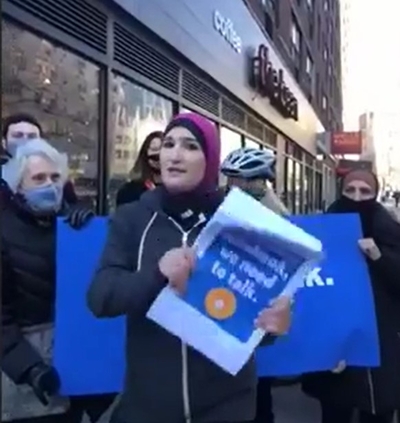 Linda Sarsour outside Facebook's New York office. |
But according to the International Holocaust Remembrance Alliance, the U.S. State Department and others, if you say Zionism is inherently racist, especially if you have no quarrel with far more ethnically or religiously homogeneous countries, you've crossed the line into anti-Semitism.
On Wednesday, Israel bashers went to Facebook offices in the United States, Europe, and even in Israel, to present petitions insisting that their ability to promote such bigotry continues. Facebook reportedly is considering updating its hate speech policy to include negative references to Zionists and Zionism, and that development has groups like Jewish Voice for Peace, American Muslims for Palestine, the BDS Movement, and MPower Change worried.
The petitions are part of a campaign called "Facebook, We Need to Talk."
During an online program promoting the petition effort, University of California, Berkeley Professor Judith Butler engaged in the very stereotyping behavior that is fueling the debate. Jews who are Zionists inherently cannot be good, she said.
"It's not because they're Jewish that they're wrong. It's because they're Zionists. And as Jews, they have a chance not to be Zionists. So we should be encouraging that position because that's the only possible, just position."
Remi Kanazi, a poet, wasn't so polite: "Zionism is the real demographic threat infecting the minds of millions with racism," he said during Wednesday's program.
Zionism is the belief in Jewish self-determination in their ancestral homeland. It is a principle supported by roughly 90 percent of Jews worldwide.
But, like Butler, the petitioners want to maintain their ability to use social media to bash the overwhelming majority of the world's Jews.
"Facebook is supposed to be a platform that provides, in particular, marginalized people who don't usually get mainstream media attention or don't get their stories told in the same way," anti-Semitic activist and MPower Change founder Linda Sarsour said during Wednesday's program while standing outside Facebook's New York offices. "To be able to share critiques, to be able to share political analysis and to be able to use words like Zionist and Zionism and not have to be labeled as hate speech and get us kicked off of Facebook."
The issue flared after an unnamed Facebook employee's email said the company may interpret attacks levied at Zionists as attacks on Jews by extension.
Facebook seemed to indicate to the technology news website The Verge that it was reviewing its policy regarding Zionist references. A decision is rumored to be coming as soon as this week. But it's unclear whether anything will change.
"Under our current policies, we allow the term 'Zionist' in political discourse, but remove it when it's used as a proxy for Jews or Israelis in a dehumanizing or violent way," a Facebook spokesperson told The Verge. "Just as we do with all of our policies regularly, we are independently engaging with experts and stakeholders to ensure that this policy is in the right place, but this does not mean we will change our policy."
In other words, no one really knows what Facebook is considering, but the coalition is ginning up outrage by claiming it amounts to a gag order on any criticism of Israeli actions or policies.
Facebook has already adopted some of these elements in an August hate speech policy update in response to calls from 130 Jewish and pro-Israel groups to better moderate online anti-Semitism. The August hate speech policy update embraced elements of the International Holocaust Remembrance Alliance's (IHRA) working definition of anti-Semitism.
But that definition specifies that "criticism of Israel similar to that leveled against any other country cannot be regarded as anti-Semitic."
It's a significant clause that went unmentioned in Wednesday's webinar.
Rutgers University Assistant Professor Noura Erakat claimed Facebook is facing "a tremendous lobbying effort ... to shut it down, to make sure that even these spaces that we have fought for and won that we no longer have access to under the incredibly perverted distorting accusation of anti-Semitism."
In the end, this is a debate about what constitutes anti-Semitism. On one side is the International Holocaust Remembrance Alliance, and 29 countries – including the United States, Canada, France and Germany – which have embraced its definition. On the other is a coalition of groups which, like Jewish Voice for Peace, "unequivocally oppose Zionism" and dream of a world without a Jewish homeland.
Copyright © 2021. Investigative Project on Terrorism. All rights reserved.


